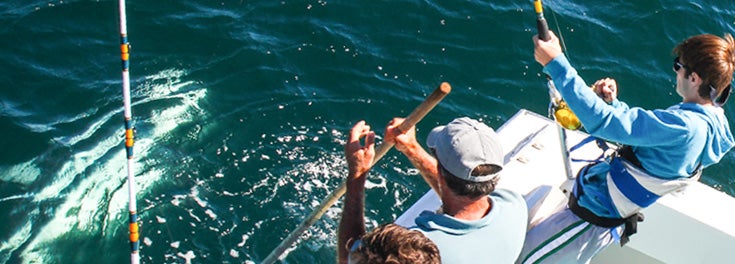
It took 20 minutes and just about every ounce of Kevin Anderson’s energy to reel in the blue shark he hooked 18 miles off the Rhode Island coast. But the URI senior—and a group of seven other students—couldn’t have been happier to be participating in two days of field work for a shark research project.
“It was a thrill and really got my adrenalin running, even though my back was killing me from the strain of the rod and my fingers were cramping around the pole,” Kevin said. “You have to have a lot of endurance.
These students got to go out fishing for sharks, see big, beautiful 9-foot sharks right next to the boat, and experience something that they will remember for a long time
The aim of the project, led by URI shark researcher Brad Wetherbee, was to capture and tag mako sharks to gain insight into the animals’ migration.
“There is a big difference between learning things while sitting in a classroom or in front of a computer and learning by actually experiencing something,” said Wetherbee. “These students got to go out fishing for sharks, see big, beautiful 9-foot sharks right next to the boat, and experience something that they will remember for a long time.”
Professor Wetherbee’s research is aimed at learning about the health of mako shark populations, the migratory routes they travel, and the locations of their preferred feeding grounds. Using conventional fishing rods baited with tuna, the students caught and helped tag two blue sharks, each about 200 pounds. Although they were unsuccessful at catching their target species, the students said the experience cemented their desire to pursue careers in the marine environment.
Junior marine biology major Kirsten Fagan, who started working with Professor Wetherbee when she was a freshman, hopes to turn the experience into a research career studying sharks and rays. Freshman Brandon Markiewicz, on the other hand, is an ocean engineering major who joined the expedition after just his first three days of college classes. He’s not sure what role sharks might play in his future, but he thinks he might want to develop the next generation of satellite tags used to track the animals.
For several participating students, the best news was that they didn’t need any shark fishing experience to join Wetherbee’s research team. Senior Carly DeLiberty had always dreamed of being a marine biologist and working on the ocean, but she had never seen a shark in the wild before joining the expedition.
Standing on the deck of the charter boat, Carly said that even though she didn’t have a chance to reel in a shark herself, she “enjoyed the atmosphere, meeting people who have the same interest I do, and I can’t wait to come back again. My dream is to work with white sharks, but I’m happy starting right here,” she said. “I’d like to tag them and research them, maybe go underwater with them. I don’t want to work at PetSmart; I want to be right here.”
